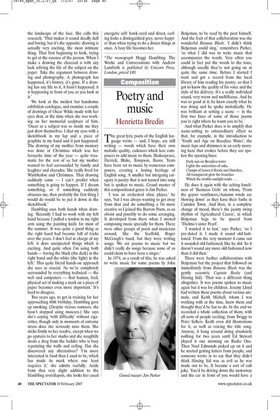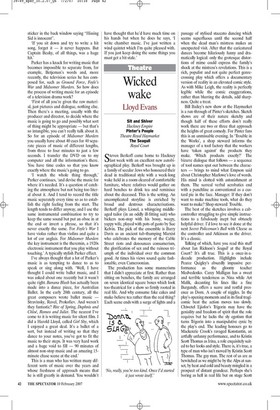Poetry and music
Henrietta Bredin The great lyric poets of the English language wrote — and, I hope, are still writing — words which have their own melodic quality, cadences which lure composers to add music to them. Shakespeare, Herrick, Blake, Tennyson, Burns, Yeats have been set to music by numerous composers, creating a lasting heritage of English song. A smaller but intriguing category is poetry that is not turned into song but is spoken to music. Grand master of this compositional genre is Jim Parker.
'I was an orchestral oboe player,' he says, 'but I was always wanting to get away from that and do something a bit more creative so I joined the Barrow Poets, as an oboist and possibly to do some arranging. It developed from there when I started composing music specially for them. There were other groups of poets and musicians around, like the Scaffold, Roger McGough's band, but they were writing songs. We set poems to music but we didn't really do songs because none of us could claim to have been a singer.'
In 1974, as a result of this, he was asked to write music for some poems by John Betjeman, to be read by the poet himself. And the fruit of that collaboration was the wonderful Banana Blush. 'I didn't think Betjeman could sing,' remembers Parker, 'so what I did was to write music that accompanies the words. Very often you could in fact put the words to the tune, although usually they're not going on at quite the same time. Before I started I went and got a record from the local library of him reading his poetry, so that I got to know the quality of his voice and the style of his delivery. It's a really individual sound, very warm and mellifluous. And he was so good at it; he knew exactly what he was doing and he spoke melodically. He was brilliant at setting a scene — in the first two lines of some of those poems you're right where he wants you to be.'
And what Parker does is to amplify that scene-setting to extraordinary effect so that, for example, in the introduction to 'Youth and Age on Beaulieu Water', the music laps and shimmers in an early morning haze that evokes before they are spoken the opening lines: Early sun on Beaulieu water Lights the undersides of oaks, Clumps of leaves it floods and blanches, All transparent glow the branches Which the double sunlight soaks. . .
He does it again with the aching loneliness of 'Business Girls' on whom, 'From the geyser ventilators,/Autumn winds are blowing down' as they have their baths in Camden Town. And then, in a complete change of mood, there's the jaunty swing rhythm of 'Agricultural Caress', in which Betjeman begs to be spared from 'Thelma's sister Pearl'.
'I wanted it to last,' says Parker, 'so I pre-dated it; I made it sound old-fashioned. From the very moment it came out it sounded old-fashioned, like he did. So it doesn't sound any more old-fashioned now than it did then.'
There were further collaborations with Betjeman but the project that followed on immediately from Banana Blush was the gently eccentric Captain Beaky (and Hissing Sid). 'That was a different thing altogether. It was poems spoken to music again but it was for children. Jeremy Lloyd had written these poems about various animals, and Keith Michell, whom I was working with at the time, knew them and thought they'd be fun to do. In the end we recorded a whole collection of them, with all sorts of people reciting, from Twiggy to Peter Sellers. Keith even did illustrations for it, as well as voicing the title song. Anyway, it hung around doing absolutely nothing for two years until Ed Stewart played it one morning on Radio One. Then Noel Edmonds picked up on it and he started getting letters from people; and someone wrote in to say that they didn't think Hissing Sid was as evil as he was made out to be. It became a sort of cult joke. You'd be driving down the motorway and the car in front of you would have a sticker in the back window saying "Hissing Sid is innocent".
'If you sit down and try to write a hit song, forget it — it never happens. But Captain Beaky, of all things, was a huge hit.'
Parker has a knack for writing music that becomes impossible to separate from, for example, Betjeman's words and, more recently, the television series he has composed for, such as Ground Force, Foyle's War and Midsomer Murders. So how does the process of writing music for an episode of a television drama work?
'First of all you're given the raw material, just pictures and dialogue, nothing else. Then there's a meeting, usually with the producer and director, to decide where the music is going to go and possibly what sort of thing might be appropriate — but that's so intangible, you can't really talk about it. So for an episode of Midsomer Murders you usually have about 40 cues for 40 separate pieces of music of different lengths, from three to four minutes to just a few seconds. I transfer the DVD on to my computer and all the information's there. You have time codes so that you know exactly where the music's going to go.
'I watch the whole thing through,' Parker continues, 'and devise the music for where it's needed. It's a question of catching the atmosphere but not being too literal about it. And I tend to record the title music separately every time so as to establish the right feeling from the start. The length tends to differ anyway, and I use the same instrumental combination to try to keep the same sound but put an oboe in at the end or invert a phrase, so that it's never exactly the same. For Foyle's War I have violas rather than violins and quite a lot of cor anglais. For Midsomer Murders the key instrument is the theremin, a 1920s electronic instrument that you play without touching.' A typically stylish Parker effect.
I've always thought that a lot of Parker's music is as tempting to dance to as to speak or sing along with. 'Well, I have thought I could write ballet music, and I was asked about one recently but it wasn't quite right. Banana Blush has actually been made into a dance piece, for Australian Ballet. In the early 20th century, all the great composers wrote ballet music — Stravinsky, Ravel, Prokofiev. And weren't they fantastic? Rite of Spring, Daphnis and Chloe, Romeo and Juliet. The nearest I've come to it is writing music for silent film I did a Harold Lloyd, called Girl Shy, which I enjoyed a great deal. It's a ballet of a sort, but instead of writing so that they dance to your notes, you've got to fit the music to their steps. It was very hard work and a huge void to fill — 90 minutes of almost non-stop music and an amazing 15minute chase scene at the end.'
This is a man who has written many different sorts of music over the years and whose freshness of approach means that he is still greatly in demand. You wouldn't have thought that he'd have much time on his hands but when he does he says, 'I write chamber music. I've just written a wind quintet which I'm quite pleased with. If you just keep doing the same things you must get a bit stale.'














































 Previous page
Previous page